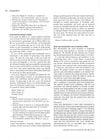 23 citations,
January 1998 in “Urological research”
23 citations,
January 1998 in “Urological research” Castration and finasteride lower urinary oxalate in male rats, potentially treating urolithiasis.
 23 citations,
June 1996 in “Toxicology”
23 citations,
June 1996 in “Toxicology” Older rats more affected by minoxidil's cardiotoxic effects than younger rats.
 15 citations,
September 2013 in “Pharmaceutical Biology”
15 citations,
September 2013 in “Pharmaceutical Biology” Jujube fruit extract may reduce kidney damage from ibuprofen in rats.
 15 citations,
March 1997 in “International Journal of Dermatology”
15 citations,
March 1997 in “International Journal of Dermatology” Selenium sulfide in anti-dandruff shampoos can turn hair green.
 6 citations,
August 2013 in “한국응용생명화학회지”
6 citations,
August 2013 in “한국응용생명화학회지” Certain natural compounds can block an enzyme linked to prostate enlargement and hair loss, showing potential for new treatments.
 June 2018 in “The Journal of Sexual Medicine”
June 2018 in “The Journal of Sexual Medicine” Finasteride helps female-pattern hair loss.

The Chromolaena odorata patch significantly speeds up wound healing.
 255 citations,
October 1985 in “The Journal of Clinical Endocrinology & Metabolism”
255 citations,
October 1985 in “The Journal of Clinical Endocrinology & Metabolism” Spironolactone treatment increases the amount of testosterone available in the body.
 193 citations,
August 1985 in “Endocrinology”
193 citations,
August 1985 in “Endocrinology” Different animals have unique versions of the enzyme that changes testosterone into another hormone, which is important for creating effective treatments for prostate and hair loss conditions.
 150 citations,
June 2014 in “Biomaterials”
150 citations,
June 2014 in “Biomaterials” Peptide hydrogels heal burn wounds faster and better than standard dressings.
 122 citations,
July 1990 in “Teratology”
122 citations,
July 1990 in “Teratology” Finasteride exposure in pregnancy causes genital abnormalities in male rats.
 104 citations,
October 1999 in “The Journal of Urology”
104 citations,
October 1999 in “The Journal of Urology” Finasteride doesn't harm male fertility or sperm quality, but may slightly reduce ejaculate volume.
 98 citations,
April 1997 in “The Journal of Steroid Biochemistry and Molecular Biology”
98 citations,
April 1997 in “The Journal of Steroid Biochemistry and Molecular Biology” Finasteride effectively blocks rat enzymes, but with varying methods and strength.
 86 citations,
March 1993 in “Toxicology and Applied Pharmacology”
86 citations,
March 1993 in “Toxicology and Applied Pharmacology” Finasteride affects male rat genitalia development, causing abnormalities during specific pregnancy days.
 86 citations,
July 1990 in “British Journal of Pharmacology”
86 citations,
July 1990 in “British Journal of Pharmacology” Diazoxide, minoxidil sulphate, and cromakalim relax rat blood vessels by opening K+ channels, with some differences in their actions.
 76 citations,
January 2019 in “Nanoscale”
76 citations,
January 2019 in “Nanoscale” Created material boosts hair growth and kills bacteria for wound healing.
 70 citations,
July 2005 in “Journal of Ethnopharmacology”
70 citations,
July 2005 in “Journal of Ethnopharmacology” Ganoderma lucidum, a type of mushroom, may help treat enlarged prostate by blocking testosterone conversion.
 70 citations,
November 1984 in “Cell & tissue research/Cell and tissue research”
70 citations,
November 1984 in “Cell & tissue research/Cell and tissue research” Vitamin D3 affects cell differentiation in specific skin areas.
 66 citations,
September 1982 in “Biochemical Pharmacology”
66 citations,
September 1982 in “Biochemical Pharmacology” Liver enzyme helps minoxidil work better for blood vessel relaxation.
 62 citations,
August 2014 in “BMC Endocrine Disorders”
62 citations,
August 2014 in “BMC Endocrine Disorders” New findings explain how genetic changes, body clocks, and certain molecules affect tissue response to stress hormones.
 58 citations,
April 1998 in “Journal of biological chemistry/The Journal of biological chemistry”
58 citations,
April 1998 in “Journal of biological chemistry/The Journal of biological chemistry” CYP2B12 enzyme in skin cells converts arachidonic acid into specific bioactive lipids.
 53 citations,
June 1993 in “Proceedings of the National Academy of Sciences of the United States of America”
53 citations,
June 1993 in “Proceedings of the National Academy of Sciences of the United States of America” LY191704 is a compound that effectively blocks a specific enzyme involved in hormone conversion and could help treat enlarged prostate and hair loss.
 49 citations,
March 2018 in “Toxicological sciences”
49 citations,
March 2018 in “Toxicological sciences” Low doses of mixed chemicals cause permanent reproductive malformations in male rats.
 44 citations,
March 2012 in “Fitoterapia”
44 citations,
March 2012 in “Fitoterapia” Germacrone from Curcuma aeruginosa may help treat conditions related to male hormones by blocking a specific enzyme.
 41 citations,
January 2020 in “Journal of Ovarian Research”
41 citations,
January 2020 in “Journal of Ovarian Research” Quercetin may help with PCOS symptoms, but more research is needed.
 40 citations,
June 2013 in “Molecular Pharmaceutics”
40 citations,
June 2013 in “Molecular Pharmaceutics” The gelatin/β-TCP scaffold with nanoparticles improves wound healing and skin regeneration.
 39 citations,
November 2016 in “Pharmaceutics”
39 citations,
November 2016 in “Pharmaceutics” The hair follicle pathway significantly affects how easily water-loving chemicals pass through the skin.
 37 citations,
February 2013 in “Maturitas”
37 citations,
February 2013 in “Maturitas” Testosterone therapy is beneficial for women's health and does not cause masculinization or liver damage, and it protects the heart and breasts.
 35 citations,
January 2012 in “The Journal of Sexual Medicine”
35 citations,
January 2012 in “The Journal of Sexual Medicine” Androgen Deprivation Therapy for prostate cancer often reduces sexual function but intermittent therapy may be more tolerable.
 34 citations,
May 2021 in “Journal of Nanobiotechnology”
34 citations,
May 2021 in “Journal of Nanobiotechnology” The 3D electrospun fibrous sponge is promising for tissue repair and healing diabetic wounds.






























